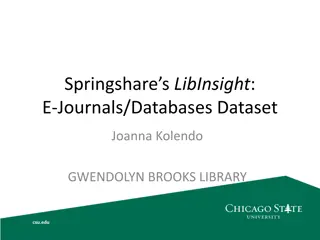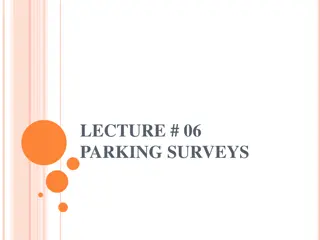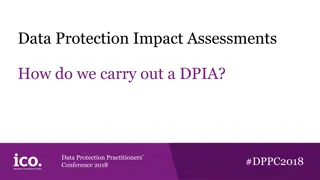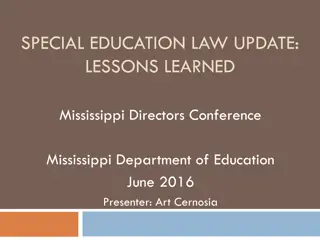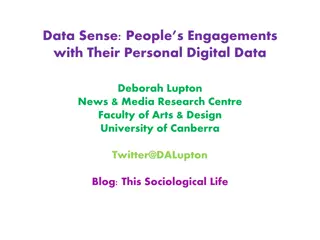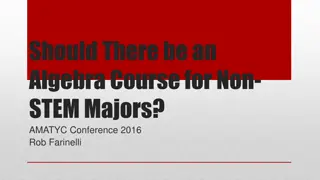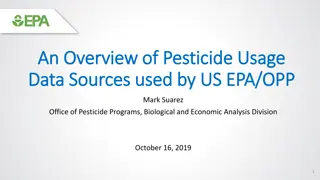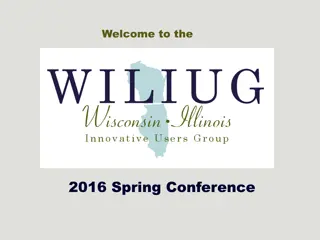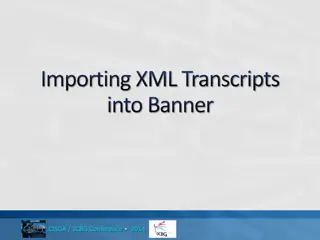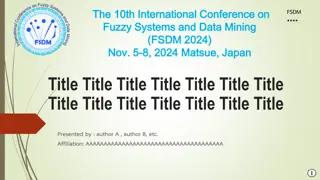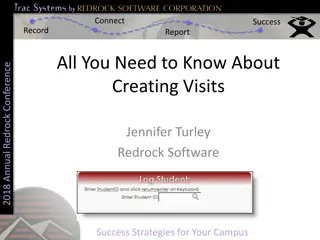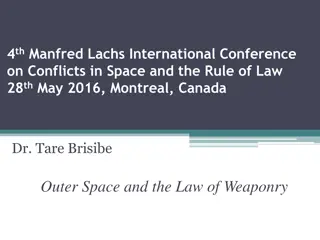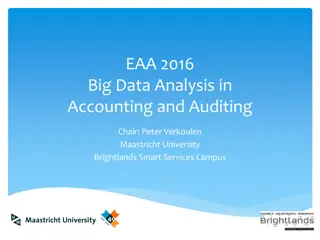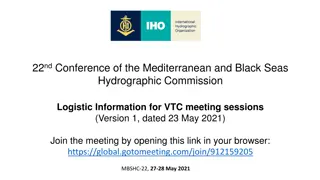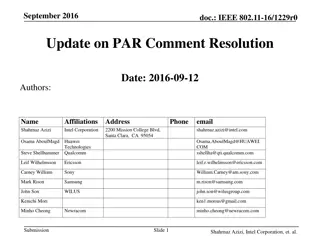Education and Data Usage in ECER 2016 Conference
Delve into the discourse on education and data at the ECER 2016 conference in Dublin, examining the distinct contributions of educational research. The presentation by J.n. Torfi J.nasson highlights critical analysis of datafication, shifting education paradigms, and the importance of evidence-based policy and practice.
Download Presentation

Please find below an Image/Link to download the presentation.
The content on the website is provided AS IS for your information and personal use only. It may not be sold, licensed, or shared on other websites without obtaining consent from the author.If you encounter any issues during the download, it is possible that the publisher has removed the file from their server.
You are allowed to download the files provided on this website for personal or commercial use, subject to the condition that they are used lawfully. All files are the property of their respective owners.
The content on the website is provided AS IS for your information and personal use only. It may not be sold, licensed, or shared on other websites without obtaining consent from the author.
E N D
Presentation Transcript
ECER 2016 University College Dublin 23.-26.8. 2016 Leading Education: The Distinct Contributions of Educational Research and Researchers Development of a Critical Analysis of the Datafication and the What Works Discourse J n Torfi J nasson, School of Education, University of Iceland jtj@hi.is https://notendur.hi.is/jtj/
The framework for the paper Points of departure, lurking in the background: 1. 2. Education, what is it? Data, are there problems? J n Torfi J nasson ECER August 2016 Dublin 3
Two starting points 1. Education Notice the sudden and in fact quite dramatic shift within the quote. The purposes of schooling have been debated from the early days of Plato to the divergent prescriptions put forth by modern day political parties. Some want to foster the development of 21st century skills while others urge greater attention to basic literacy and numeracy. Given the ubiquitous presence of the Web, there are calls for schools to develop critical thinking and evaluation skills. Likewise there are expectations that schools will develop positive attitudes, physical fitness, belongingness, respect, citizenship, and the love of learning; that is attributes of character development. Perhaps the most common expectation, however, is the development of achievement, and that is the focus of the book. For as long as schools have existed, enhanced student expectations achievement has been the most important outcome at any school level .(p. xix). Hattie and Anderman in Hattie, J., & Anderman, E. M. (2013). International guide to student achievement. London: Routledge. Moving from defining education as a broad endeavor to a very narrow one. J n Torfi J nasson ECER August 2016 Dublin 4
Two starting points: 2. Data, evidence Cooper, Levin, and Campbell (2009) remind us that it is virtually impossible for a reasonable person to disagree with the idea that policy and practice should be based on the best available evidence (p. 161). [Well, which is the best?] the evidence against the usefulness of all our testing is robust and compelling (p. 305). And the perverse consequences of heavy testing in Philadelphia .. disregard for subjects (specifically writing and science) that had no bearing on determining a school s Adequate Yearly Progress. (p. 304). Abrams, S. E. (2016). Education and the commercial mindset. Cambridge, Massachusetts: Harvard University Press. [But which stakeholders really listen to this type of argument; listen to the best available evidence.] Despite strong empirical support and early enthusiasm for PSI (Personalized system of instruction), it is not a dominant form of teaching today . Fox, E.J. (p. 360) in Hattie, J., & Anderman, E. M. (2013). International guide to student achievement. London: Routledge. [There is a lot of old a new evidence no one listens to perhaps justly so.] J n Torfi J nasson ECER August 2016 Dublin 5
The framework for the paper The paper is in four sections and a brief discussion, where we present the outline of an argument positing the pros and cons, and usefulness of the of the use of data and the what works idea in education and attempt to place it in the context of the more general discourse on the value of research and evidence in education. I am attempting to frame the discussion noting how many different perspectives should be attended to. A somewhat panoramic presentation. 1. 2. 3. 4. 5. Presented by headlines The issues Why is data or research so useful? Some problems that have to be faced and dealt with (e.g. within what works Where do we stand? What are the options? Discussion J n Torfi J nasson ECER August 2016 Dublin 6
A general background to the main issues: Case opened and closed Research: I take it as a premise for my discussion that it is absolutely vital for the global society, and its parts, to foster research. Research enlightens, explains, informs, inspires, debunks myths, opens up new venues and perspectives, simplifies - but also shows complexities and connections that were not seen before and research often suggests problems or deficiencies in what we have been doing (or have neglected). Data - evidence: I also take it for granted that when taking most decisions within the public sphere, we demand that they are informed, based on a careful collection of data which is guided by the rules of science. This ensures that the decisions are transparent, balanced, deliberated and neither whimsical nor capricious, idiosyncratic, politically biased nor self-serving. Any decision that affects the equity between students, their progress or current or future well-being shall be based on data. Data, can be inspiring or motivational, it can charter progress being made and seems also to be necessary to enable us to place trust in a system: it must demonstrate that it functions well by using solid data. Thus there can hardly be any doubt that we should relentlessly concentrate on fostering both research and the use of data evidence in education. These are the elixir of progress. The more the better. So the case seems to be closed? Get going! J n Torfi J nasson ECER August 2016 Dublin 7
A general background to the main issues: Not quite But it can be argued that this is far from being so: The ethos of science - that we cherish - can be rather merciless in demanding critical analysis of methods and concepts and the way we ask questions, collect data, interpret them and use. Thus when we turn the search light of science on itself it reminds us that despite its importance, science cannot do everything, inter alia may neither be able to answer some of the most important educational questions nor give us all the guidance we may be set to expect from science and rigorous data. Even if we leave aside the complications that arise when defining the central concepts (research, data, evidence, good education, achievement, progress, ) and also a host of technical (methodological) problems when doing research or collecting data which are there, of course, but often ignored, - we still face a number of even more difficult questions or issues to deal with. So the case is wide open again. J n Torfi J nasson ECER August 2016 Dublin 8
The framework for the paper Why is data or research so useful? J n Torfi J nasson ECER August 2016 Dublin 9
Why is research and data obtained, obeying the rules of science, so useful? Research (see above, but not the focus here) Data presents evidence Data points to deficiencies. E.g., something is not working See e.g. PISA volume II. Excellence through Equity: Giving Every Student the Chance to Succeed Data shows standing and progress or does it? Sometimes Data may suggest alternatives (i.e., by comparison, but normally limited venues) Data may show patterns - otherwise indiscernible It is useful to give feedback (or is it? It does not feed forward) J n Torfi J nasson ECER August 2016 Dublin 10
Why is data or research so useful? - What does data look like? Data comes in many shapes and sizes (case studies, national tests, Hattie s work, PISA, meta-analysis, evaluations, .) The contexts in which data is gathered and used vary enormously and it is misleading to talk about data as if all had similar characteristics, purposes, strengths and weakness School based, national or international test data; data from individual studies or meta-studies; data on achievement, enjoyment of school, drop-outs, . Similarly the distinction between big data (e.g., PISA) and small data (e.g., progress of a single student) and the different advantages of each may be important. Either can be sampling data or data on each possible point (e.g., each student as she progresses). J n Torfi J nasson ECER August 2016 Dublin 11
The framework for the paper Some problems or issues that have to be faced and dealt with J n Torfi J nasson ECER August 2016 Dublin 12
The framework for the paper What works? What is it? And what about it. Most of the interesting aspects are common to the whole of the research, datafication, evidence based discourses -except perhaps some of the specific methodologies and infrastructures that have been developed. So I don t deal with this explicitly despite the title see appendix J n Torfi J nasson ECER August 2016 Dublin 13
Data With data we face essentially the same problems as with research Data is limited, but also simplifies things, makes the discourse manageable Data is limiting, encloses the educational discourse Data is seductive, it is concrete Data is controlling, also overwhelming (PISA, etc..) Data also lends education to commodification There are issues or challenges Data is based on the past it is in that sense backward looking Data seems to tell you where you stand but does it? Only in a very limited sense. Data does not tell you were to go, what to do (but it may tell you if you need to do something) In that sense data (e.g., marks), is not (formative) feedback J n Torfi J nasson ECER August 2016 Dublin 14
Thus, some problems that have to be faced and dealt with What is researched? What data is collected? What areas are researched? Who decides? On what is the data collected? What are the metrics? What amount or volume of data is collected? Who decides what data is being used? The quality of data vis- -vis its robustness and validity - data as evidence. Validity often totally ignored. What guidance does it give? (Often stop do something) In what context can data direct action? For policy or practice. Hardly any To what extent do the causal designs help? RCT etc. J n Torfi J nasson ECER August 2016 Dublin 15
The framework for the paper Where do we stand? What are the options? J n Torfi J nasson ECER August 2016 Dublin 16
Where do we stand? What are the operational options? We respect the demands of a truly scientific approach! There is no way of circumventing a rigorous approach when dealing with research or data; it is a question of when other discourses are more appropriate. Respect fully the conceptual complexity of education! Education should not be at the merci of reductionism and it should be recognized that in its essence it is a very complex undertaking. But is continuously reduced to something measurable on incredibly few variables with no attempts at construct validation of any of them. This is done with the consent of many within the educational edifice. The logistics of using data Infrastructures: collecting- disseminating - applying We know that it is major task to collect research data sensibly. But no less to communicate it to all the stakeholders and then apply it sensibly. Therefore there have been founded a number of institutions, e.g. The Danish Clearinghouse for Educational Research, Evidence for Policy and Practice Information and Co-ordinating Centre (EPPI-Centre) or the US What Works Clearinghouse in Education and the OECD PISA is partly of the same ilk. This connects to the main concerns expressed by Hattie (about evidence not being used). And we don t know to what extent these structures benefit education in principle. J n Torfi J nasson ECER August 2016 Dublin 17
Thus we have important tasks that should be formally undertaken Deliberate openly which questions can be answered by data It must be discussed which are the important questions in each case and to what extent these are actually being answered or informed by the data. Explore the extent to which data defines education Related is the question to what extent the education being engaged in is being wholly or partly defined by the data being used or being inspected. Investigate the accessibility of data and to whom How easy is it (in very pragmatic terms) for individual teachers or schools or politicians to come by and to digest the existing or available data in order to inform their teaching or policy making without the threat of taking a too narrow view (may use PISA as an example). Critically examine the institutionalization of the data collection effort and of mistrust in educational professionalism If we want to proceed with developing measuring (testing) and evaluation instruments, we be moving towards the shifting of trust in institutions towards trust in instruments Borman and John, 2013. J n Torfi J nasson ECER August 2016 Dublin 18
And these (important tasks that should be formally undertaken) Map and clarify the positive underpinnings of using research or data It must made clear to everybody, that despite serious shortcomings, solid evidence is preferable to none, when the decisions made are ostensibly empirically based but it doesn t answer all the major questions. Map and critically examine the positive and negative effects of using data We must systematically map the positive, but also the negative effects of using data, and face the possibility that it should perhaps not be used when we thought it should. Map the vested interest, both public and private It should not be shied away from to map the enormous vested interests, political, professional and financial, that push the use of tests, meta-analysis and evaluations. The stakeholders include the academics. J n Torfi J nasson ECER August 2016 Dublin 19
. Discussion Include more systematic conceptual analysis Given the strength of data, the necessity of the scientific method, the importance of systematic overview - it becomes absolutely imperative to dwell on a critical analysis of each individual project, taking into account all the perspectives presented here. J n Torfi J nasson ECER August 2016 Dublin 20
Discussion - conclusion Most of the issues that I have mentioned are well known but neither the extent to which data can be used to answer the important educational questions nor how the datafication affects the way we look at education and proceed within education has been holistically and critically explored. J n Torfi J nasson ECER August 2016 Dublin 21
Thank you J n Torfi J nasson ECER August 2016 Dublin 22
The framework for the paper What works? What is it? J n Torfi J nasson ECER August 2016 Dublin 23
What is the what works idea in the field of education It is quite simply that by using any of well established scientific methods it is possible to discern what approaches are superior to other ones. The methods are well recognized and the data collection is required to be meticulous. Through a properly organized experiment or through elaborate statistical analysis it is possible to determine which methods give better results than others. J n Torfi J nasson ECER August 2016 Dublin 24
What works: What is the basis for the idea? The basis for the idea are in at least two layers: I. The operation of school should be organized on the basis of thoroughly tested methods. There is no excuse for not doing it. Never should a an approach, a method, a curriculum be used on a large scale unless it has been thoroughly tested. II. By analyzing the methods we use we understand their strengths an weakness and in the process we can weed out bad ones and retain or enhance or develop the good ones. J n Torfi J nasson ECER August 2016 Dublin 25
What works: What are the methodological issues? I. There are several methods used, all of which have some distinct advantages but also some methodological problems to solve 1. RCT methods (randomized controlled trials) -sometimes structural modelling 2. Correlational methods 3. Meta-analysis (see e.g. the AERA journal Review of Educational Research) 4. . II. The problem of context III. Validity issues (in particular examination of construct validity) - most often totally neglected IV. Granularity - big vs. small data J n Torfi J nasson ECER August 2016 Dublin 26
What are the conceptual issues? There are two fundamental issues here I. The most important is the question of what object works refers to. To education obviously. But what do we mean by education? So the implicit question is: what works best to convey the best education? But there are two well-known problems already: a) Do the curricular ingredients being the focus of the data collected really give good education? Might they be irrelevant, even obsolete, far inferior to achieve the aims than some alternatives? b) Even if the curriculum in question survives a critical questioning, the same may not hold for the evaluation or testing mechanisms. It might be that the validity of test would not survive a critical inspection. II. But in principle the research does not allow the deduction that a certain method or approach should be used on the basis of achievement progress because there could be a) educational, b) ethical, c) financial, or d) professional reasons for not working along those lines. J n Torfi J nasson ECER August 2016 Dublin 27
What are the developmental issues? It is a very conservative idea. How does this general approach ensure innovation, encourage people to use totally new approaches, new materials, new environments? Perhaps the biggest problem with the idea is its conservative nature. Except on a very small scale, the idea is based on investigating tested ideas, something that has been around for a long time. In particular meta-studies rely on a multitude of studies undertaken over a time period and often relying on data easily extending a decade, even decades back. And the ingredients of the education in question may often be old stuff; it is essentially a backward looking exercise. In particular it may well be largely based on outdated curriculum. Even though the idea can be usefully harnessed to push out completely irrelevant methods or approaches, it is definitely not future oriented. And totally novel approaches would normally need time in order to develop and reach the level of sophistication that allowed them to be recommended; by that time other novel ideas might already be much more promising. J n Torfi J nasson ECER August 2016 Dublin 28
What are the logistic issues? Would one envisage an implementation of the most favored good practices? This relates to the methodological issues. Assume that certain approaches are shown to be generally favorable and thus seem to be worthwhile attending to. What kind of methodological detail need to be known and what kind of encouragement or coercion would be needed to enable these approaches on a grand scale? What would the implementation phase look like. In particular if it is assumed that the teachers are the initiators of change, what kind of infrastructure would be needed (e.g., research time) in order to allow them the theoretical deliberations and practical insight to adopt these ideas and phase them into their practice? J n Torfi J nasson ECER August 2016 Dublin 29
How far can it takes us? Given the contextual constraints discussed before it seems quite clear that it can be stipulated what either doesn't work or what works less well than comparable approaches or ideas. Thus it would probably be fairer to use the headings what doesn t work , or what works worse or perhaps what works better and probably should all these headings be used as fit, and that is probably how most of the informed proponents understand the idea. Thus the research may be used to suggest that certain approaches should not be used, or other approaches are preferable to certain others given the context of the research. J n Torfi J nasson ECER August 2016 Dublin 30









